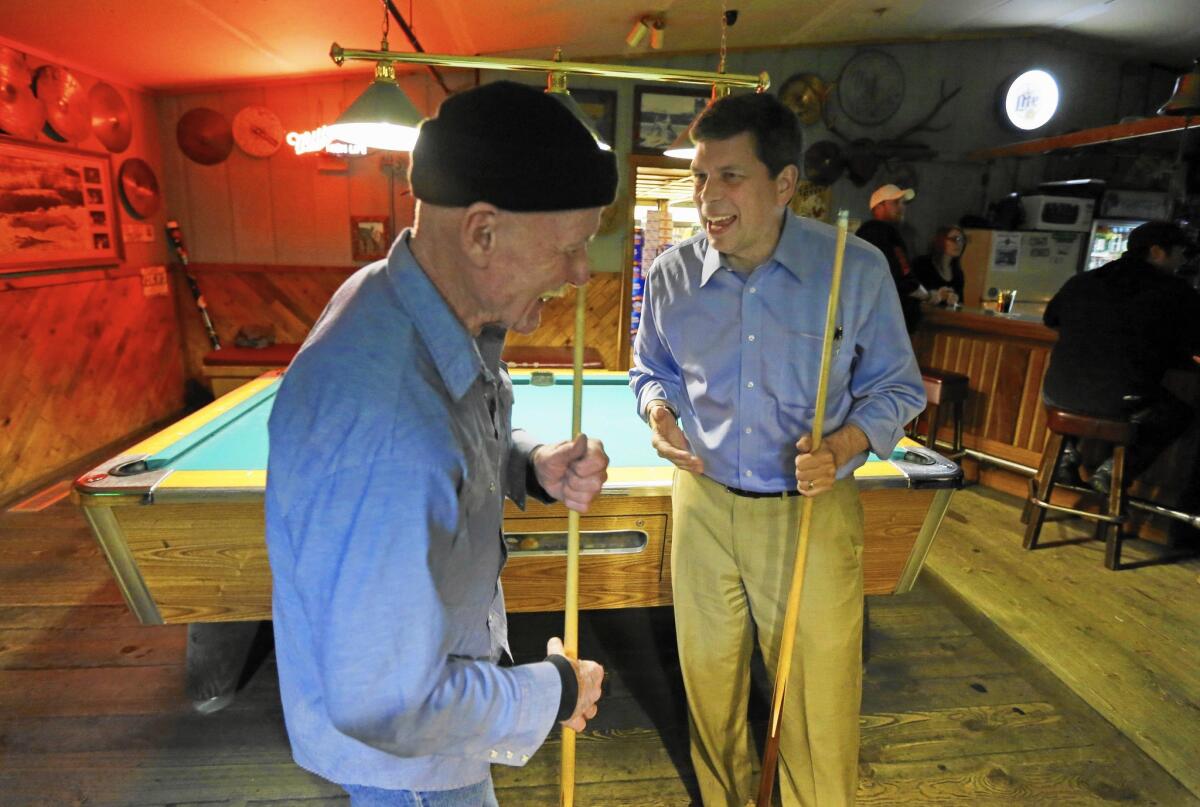Alaska incumbent Sen. Mark Begich avoids even saying ‘Obama’

- Share via
Reporting from ANCHORAGE — The simple question is at the top of many minds this grumpy election season, even among the 1,000 or so high school students gathered for a televised debate: “How will you work to reach across partisan lines to accomplish real goals?”
Incumbent Sen. Mark Begich, a Democrat in a tight race, started his answer by shoving his party’s president gently under the campaign bus, talking about the need to open the Arctic National Wildlife Refuge to oil drilling, anathema to the Obama administration.
Only then did he get around to his record of working with anyone, “no matter who they are.” Republican Sen. Rand Paul of Kentucky, a libertarian and tea party favorite. Vermont Sen. Bernie Sanders, an independent and self-described socialist. And, always, the senior senator from the Last Frontier.
“Lisa Murkowski and I, Republican and Democrat, this last year voted 80% together,” Begich boasted, a claim he makes at campaign stops from Barrow to Ketchikan. “No other senators in a split delegation in the country have that kind of voting record.”
Begich invokes his Republican counterpart so often that Murkowski sent him a cease-and-desist letter when he ran an ad calling them a “great team.” But the name “Obama” rarely escapes his lips — and only then when a prospective voter mentions the president first.
Like many Democrats locked in tight races, Begich is betting that his odds of victory go up the more distant he seems from President Obama. But few Democrats this election season face the kind of hurdles that stand between Begich and a second term.
Well more than half of the electorate here does not align itself with either major party — although if pressed that group tends to lean Republican — compared with about 40% nationwide. The last time Alaskans sided with a Democrat seeking the White House, the Beatles had just premiered on “The Ed Sullivan Show.”
Only a third of Alaskans approve of the job Obama is doing, among the lowest rates in the country and almost 10 percentage points below the nation as a whole. And then there is the simple fact that politics in this vast, sparsely populated state bears scant resemblance to that practiced in what people here describe as “Outside” — or the Lower 48 when they’re feeling generous.
“Mark Begich is pro-gun, pro-choice, pro-oil and -gas development, pro-gay marriage,” said campaign spokesman Max Croes. “Those are four things that perhaps don’t make sense in deep blue California or deep red Wyoming. But here in Alaska, that’s where the majority of the people are.... [Begich] is running for Alaska.”
The race between Begich and Republican rival Dan Sullivan, a former state attorney general who has served 20 years in the Marine Corps and Reserves, appears to be a toss-up. Polls show Sullivan, who has been endorsed by Murkowski, slightly ahead, with one big caveat: Polling is notoriously difficult here because so many Alaskans live off the grid, off the road system and away from dependable cellphone service.
The 2008 Senate race was so tight that Begich was behind on election day proper, and was only able to claim victory once outlying votes were counted. The victory margin was about 3,800 votes, despite the fact that incumbent Ted Stevens, a powerful Republican, had been found guilty of corruption just days earlier. (The conviction was later thrown out because of prosecutorial misconduct.)
So it’s little wonder that Begich rarely misses a chance to say how much he disagrees with the president, who won only 37.9% of the vote in Alaska that year.
At a town hall meeting on the east side of Alaska’s biggest city, not that far from where the candidate grew up, Begich took a swipe at the Affordable Care Act, which he takes pains not to call Obamacare: “We’ve got work to do. We’ve got to fix it. We’ve got to make it better.”
Facing a packed house at the Muldoon Boys & Girls Club, he allied himself with Murkowski against the president on a key foreign policy issue. “Sometimes she and I conflict with Obama, like the latest thing on Syria funding,” he said. “I couldn’t support him on funding the rebels in Syria — couldn’t do it.”
Even when a supporter took Sullivan’s mantra and turned it into a compliment — “They use it negatively against you that you have voted with President Obama 97% of the time.... I think that’s a great thing” — Begich pushed the president away.
“There are people who like the president and people who don’t,” Begich said. “This race is not about the president. He’ll be gone in two years. This is about Alaska. It’s about a Senate seat for the next six years. What that other guy wants to do is only make it about the president.”
What was left unsaid in that exchange was just as important as the words the candidate uttered. He didn’t mention the president’s name or just who “that other guy” is. If there is a name that’s more absent from a Begich campaign than Obama, it would have to be Sullivan.
Sullivan argued in a recent interview that Begich was running away from six years of votes in Washington, and that his opponent’s performance was fair game.
“I’m hitting [Begich] on his record,” Sullivan said. “I’m hitting him on his votes. I’m hitting him on his lack of pushing back against the Obama administration’s overreach in Alaska. And that’s what an election should be about.”
Asked why his tactics sound an awful lot like those used against other vulnerable Democrats — Minnesota’s Al Franken, for example — Sullivan said it was because Franken’s record was the same as Begich’s.
The Democrat does not believe Sullivan’s explanation for a second. His opponent, Begich said in an interview, “has taken on the national talking points” churned out by the Republican Party: The deciding vote for Obamacare was cast by (fill-in-the-blank Democrat), who also voted for the president’s priorities “97% of the time.”
“It’s all the same in every state,” Begich said, adding that he doesn’t have to bring up the president when he’s on the stump because his opponent was “already invoking Obama a lot.”
What’s not the same are the high stakes of the Senate race here. Like a small handful of other states, Alaska could have an impact that goes far beyond its chilly borders. And that’s something Begich reminds voters every chance he gets.
“All eyes are on Alaska,” he told the crowd at the Boys & Girls Club in urgent tones, microphone in hand. “You and this room and others like you will determine this race and who controls the United States Senate. There has never been a time, other than statehood, that Alaska is in the forefront.”
Remember all those other races, he asked the men and women in the room, when we’d be the last ones to turn in our votes? Alaska’s at a time zone disadvantage, an hour earlier than the West Coast, four hours earlier than the East.
“No one cared,” Begich reminded them. “They’d have the lights off already, the national news, because no one cared. This time, all eyes are on Alaska. What we do here will make a difference.”
Twitter: @marialaganga
More to Read
Get the L.A. Times Politics newsletter
Deeply reported insights into legislation, politics and policy from Sacramento, Washington and beyond. In your inbox twice per week.
You may occasionally receive promotional content from the Los Angeles Times.











